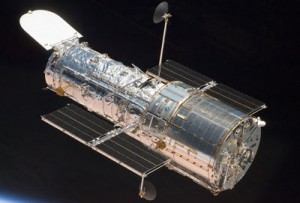Idolizing Hubble
We sure do love our celebrities, don’t we? And I don’t mean whatsisname, who won on American Idol last night. I’m talking about the newly upgraded Hubble Space Telescope, whose astronaut repairmen received a call from President Obama yesterday, and will deliver live testimony from space at a Congre…

We sure do love our celebrities, don't we? And I don't mean whatsisname, who won on American Idol last night. I'm talking about the newly upgraded Hubble Space Telescope, whose astronaut repairmen received a call from President Obama yesterday, and will deliver live testimony from space at a Congressional hearing today. An appearance on Leno is a shoo-in.
What other science instrument has Hubble's star power? Maybe the Spirit and Opportunity Mars rovers, but that's about it. And mostly, it's deserved. Hubble is the sharpest, most sensitive eye on the sky we have. But it's not the only one, nor the best we'll ever build. And therein lies a point.
Six years ago, the astronomy community faced a decision—keep Hubble going, or abandon it, move on, and use the money to build newer, better space telescopes. Hubble won out, but the choice wasn't easy, and it had a downside. Due partly to the added cost of more upgrades (and mostly to other NASA budget pressures), there hasn't been money for other astronomy projects, like building telescopes to hunt for Earthlike planets or study dark matter.
Hubble is fabulously expensive—its total cost to design, build, launch, and operate is estimated at upwards of $9 billion in today's dollars. And that doesn't count the five shuttle missions to repair and upgrade it at regular intervals. This most recent repair job alone cost nearly $1 billion.
Is Hubble worth it? Depends on how you measure it. One analysis of citations in scientific papers (a common measure of "productivity") found that Hubble observations accounted for 19 percent of the citations in astronomy papers published in 2001, the largest number for any optical-wavelength observatory. But the number of citations per paper was only average compared to other optical observatories like Keck.
This is hair-splitting, sure, and not meant to sound ungrateful for the skillful repair job by the STS-125 astronauts. Hubble is an awesome, historic instrument. But should we become so celebrity-struck that we only pay attention to the star performers? Bureaucratically, it's always easier to feed a few big projects than a lot of little ones, however deserving. And that's a habit we may someday have to break.